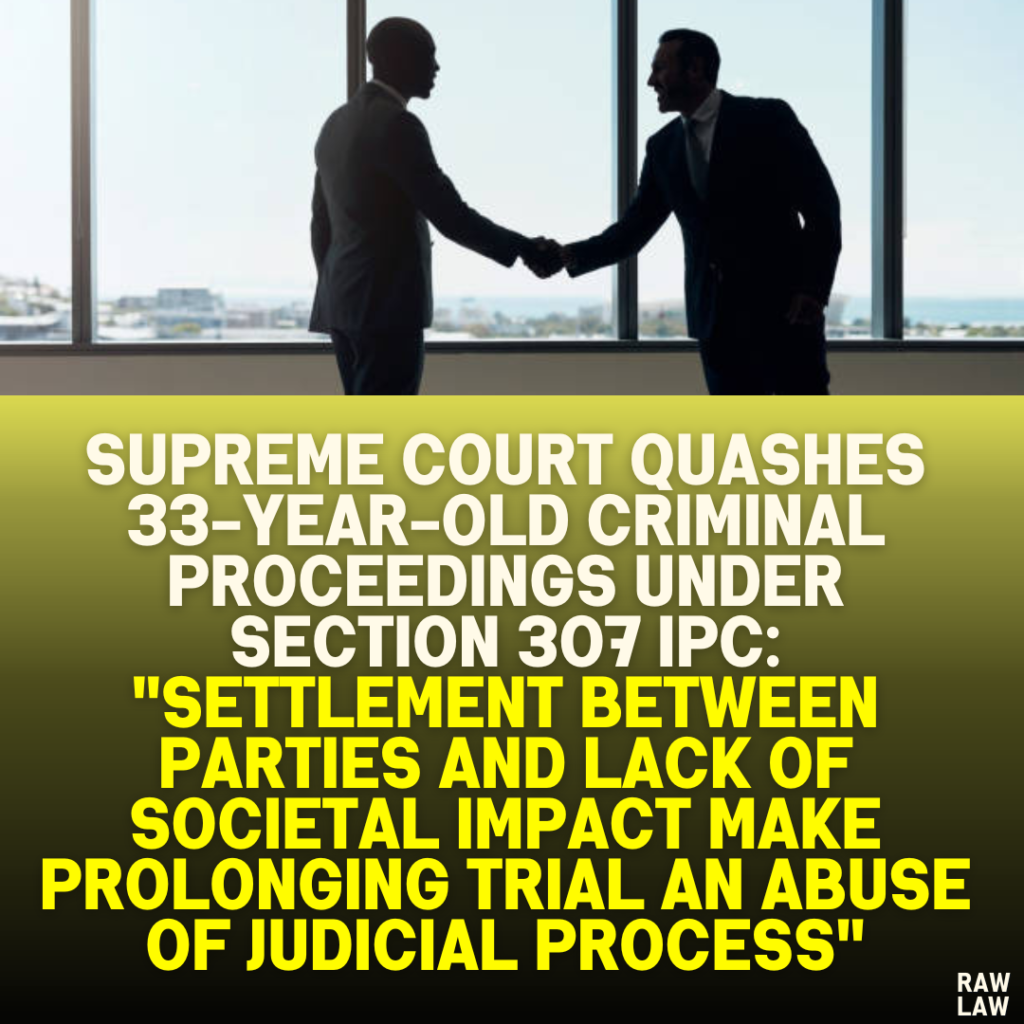1. Court’s Decision
The Supreme Court quashed the criminal proceedings under Section 307 IPC (attempt to murder) and related charges, overturning the Allahabad High Court’s order. It emphasized that continuing the trial, given the settlement between the parties and the facts of the case, would serve no useful purpose and would constitute an abuse of judicial process. The Court ruled that the alleged offence did not have a serious societal impact and was suitable for resolution through settlement.
The Court clarified that while heinous offences affecting public well-being cannot be quashed even with a settlement, this case did not fall into that category. It allowed the appeal and directed the quashing of proceedings pending before the Additional Chief Judicial Magistrate in Moradabad, Uttar Pradesh.
2. Facts
- Incident and FIRs: The dispute originated from an irrigation-related altercation in Moradabad, Uttar Pradesh, on August 11, 1991. The appellants and the complainant, Mahmood, lodged FIRs against each other on the same day. Mahmood alleged that the appellants assaulted him with lathis and iron bars, and Abdul Waris (since deceased) fired a gun during the incident.
- Injuries: Mahmood sustained injuries, including contusions, abrasions, and a fracture in his left ring finger. The alleged gunfire did not cause any injuries.
- Investigation: The police concluded in a closure report that the allegations against the appellants were false and motivated as a counterblast to their prior FIR. However, in 1992, the trial court rejected the closure report and summoned the appellants for trial.
- Delay in Proceedings: The criminal revision filed by the appellants to challenge the trial court’s order remained pending for over 23 years and was dismissed in 2015. The appellants learned of the dismissal only in 2022, when summons were issued.
- Settlement: In December 2022, both parties entered into a settlement mediated by village elders, and Mahmood submitted an affidavit supporting the compromise.
3. Issues
The Supreme Court considered the following issues:
- Whether criminal proceedings under Section 307 IPC could be quashed when the parties had reached a settlement.
- Whether the injuries and allegations justified invoking Section 307 IPC (attempt to murder) or warranted a lesser charge, such as Section 326 IPC (voluntarily causing grievous hurt).
- Whether continuing the trial would amount to an abuse of judicial process.
4. Petitioner’s Arguments
- The petitioners argued that the dispute was personal and had been amicably resolved.
- They contended that the injuries sustained by the complainant did not support a charge under Section 307 IPC.
- The continuation of criminal proceedings would serve no public interest and would be a futile exercise given the 33-year-old incident and the compromise reached between the parties.
5. Respondent’s Arguments
- The State left the decision to the Court’s discretion, arguing that the principles governing quashing of proceedings under Section 482 CrPC should be applied.
- The complainant (Mahmood) supported the settlement and submitted that he had no objection to the quashing of proceedings.
6. Analysis of the Law
The Court analyzed the distinction between compounding of offences under Section 320 of the CrPC and quashing of proceedings under Section 482 CrPC:
- Compounding of offences: Limited to offences specified under Section 320, which can be settled with or without court approval.
- Quashing of proceedings: Involves broader discretion under Section 482 CrPC, enabling courts to quash even non-compoundable offences if the settlement promotes justice and does not harm societal interests.
The Court referenced the landmark judgments of:
- Gian Singh v. State of Punjab (2012): Highlighting that quashing of criminal proceedings is distinct from compounding and can be exercised if justice requires it.
- State of Madhya Pradesh v. Laxmi Narayan (2019): Holding that heinous offences (e.g., murder, rape, dacoity) with societal impact cannot be quashed, but private disputes (e.g., family, matrimonial, or financial disputes) can be resolved through compromise.
- Ramgopal v. State of Madhya Pradesh (2022): Outlining parameters for quashing criminal proceedings, such as the nature of the offence, injuries caused, voluntary nature of the compromise, and societal impact.
7. Precedent Analysis
The Court distinguished this case from situations where offences like murder or rape are involved, noting that:
- The injuries were minor, and the weapon (a rifle) used in the alleged firing was not recovered.
- The case did not involve heinous crimes or mental depravity.
- The primary accused in the firing (Abdul Waris) had passed away, and the role of the appellants was generalized.
8. Court’s Reasoning
- Nature of Injuries: The injuries sustained by the complainant were not inflicted on vital parts of the body and did not suggest an intent to murder, making Section 307 IPC inapplicable. The injuries were consistent with offences under Section 326 IPC at best.
- Delay in Proceedings: The case had been pending for over 33 years, with no substantial progress, making the continuation of proceedings a waste of judicial resources.
- Settlement and Public Interest: The Court observed that the parties had voluntarily settled the dispute and that the offence did not have a societal impact warranting denial of relief. It emphasized that the goal of criminal justice is to ensure peace and resolution, not to prolong futile trials.
- Abuse of Process: Proceeding with the trial, despite the settlement and the absence of serious allegations, would be an abuse of judicial process.
9. Conclusion
The Supreme Court quashed the criminal proceedings under Section 307 IPC and related charges, setting aside the High Court’s order. It held that the compromise between the parties should be respected, as continuing the trial would not serve justice.
10. Implications
This judgment reinforces the principle that courts must distinguish between crimes of a private nature and heinous offences with societal impact. It provides clarity on the circumstances under which non-compoundable offences can be quashed, promoting dispute resolution while safeguarding public interest. The decision emphasizes the role of judicial discretion in balancing legal principles with pragmatic justice.
